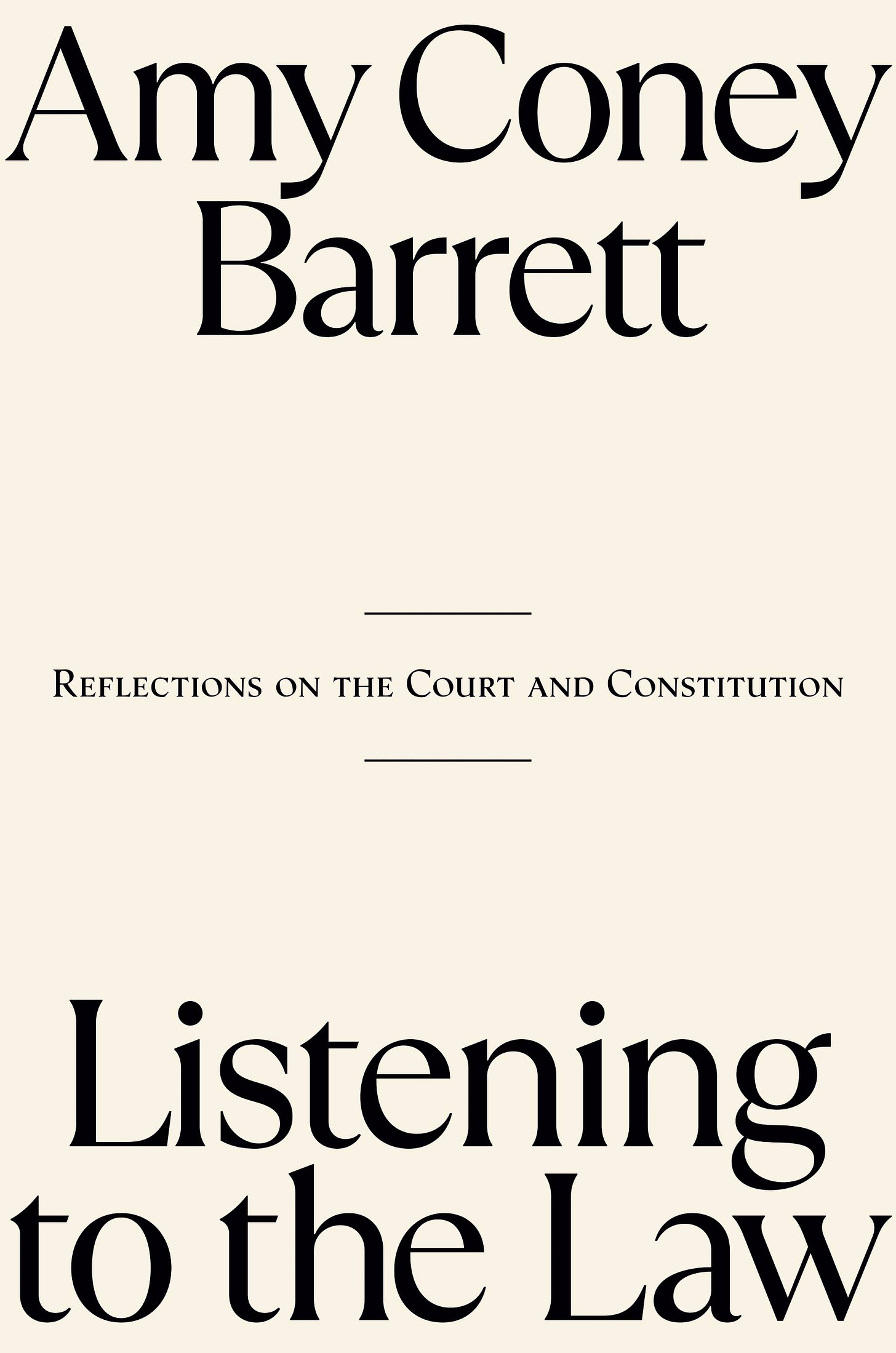Listening to Justice Amy Coney Barrett
A few reflections on her book
Last night I had the great fortune to sit down with Justice Amy Coney Barrett to talk about her new book, Listening to the Law: Reflections on the Court and Constitution. This was for an event at the University Club of Chicago, with the Chicago Institute of Politics, and there was no public recording of the event, so I will just say that I left the event extremely impressed by her integrity and commitment to her judicial oath.
As for the book:
The greatest part of the book is basically the official story of the law — the Supreme Court doesn’t make law, and the Justices aren’t allowed to indulge their personal or political beliefs; neutral judging requires originalism, which is neither excessively wooden nor excessively capacious; and that’s why Roe had to be overturned and its overturning doesn’t reflect anything political or nefarious, etc. These parts of the book will not be news to law professors or most readers of this blog, but that’s not a bad thing. I think this is the single book I would most want to give to any lay person who wanted to understand the Court.
Surrounding and sprinkled throughout this account are various personal stories and anecdotes about Justice Barrett, her life, her family, and so on. I was especially charmed by a discussion in the first chapter about when Justice Barrett faced a child-care crisis on the morning of a high-profile oral argument because her son’s school was closed and her husband’s flight home was cancelled and she had to scramble to find coverage. These discussions add a humanizing quality to the book. Plus, on a personal level, as somebody who frequently juggles parenting and professoring obligations, it made me think — boy, if Justice Barrett can handle her vaster parenting and professional obligations with such aplomb and good cheer, I should be able to manage mine.
Finally, throughout this account there are also occasional specific nuggets about the Court that I don’t recall seeing confirmed semi-officially before. For instance: her account and defense of why the Supreme Court law clerks who recent graduates rather than experienced lawyers (it has to do with responsibility and judgment); her explanation of when she requests changes to a majority opinion before joining it (only when it is wrong or likely to mislead); and her statement that the Chief Justice keeps the opinions in most of the important cases for himself. It might be worth reading the book for these nuggets alone.
I fear that this book will not get the reviews it deserves, because of the many things it does not do and does not try to do — provide juicy inside gossip about the Court; provide hope to liberals that Justice Barrett secretly shares their views; provide hope to conservatives that Justice Barrett is secretly “based.” What it does do is give a great account, hopefully a canonical one, of the official story of our law in 2025.
I’ve heard it said that the American people get the Supreme Court Justices they deserve. I’ve had my disagreements with her decisions, but I think Justice Amy Coney Barrett may be a better Justice than we deserve.



What about Trump v. United States? That’s the text book example of “made up” law that has absolutely no basis in the Constitution. If one of the Founders had said, “Oh, by the way, while the proposed constitution says nothing about this, nevertheless we intend that the President will be immune from civil and criminal liability for acts he takes while President,” does anyone seriously think for a minute that the Constitution would have been ratified? Of course not! Not an ice cube’s chance in hell! Barrett favored that nonsense. Thus, I cannot accept Will’s fanboy review.
I wondered if you'd be so kind to elaborate on a couple of points in your article:
1. If "...Roe had to be overturned...", then don't Loving, Griswold, Lawrence, and Obergefell have to be overturned? Maybe Miranda?
2. "...Justices aren’t allowed to indulge their personal or political beliefs..." Do you think it's unreasonable that some of us believe that judicial philosophy is to some extent a get out of jail free card for indulging your personal or political beliefs in judging. As just one example, as I understand it, Alito has never ruled against a sincerely held religious liberty claim. And after Dobbs, he gives the speech in Rome where he laments that the world is not more religious. So we are to believe his personal beliefs about the importance of religion in no way affect his rulings related to religious liberty claims? Consider me skeptical.